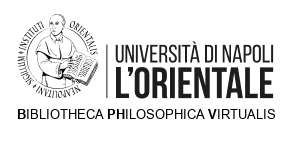Soliloqui / Agostino, Bompiani, Milano 2002
Nei "Soliloqui" l'oggetto d'indagine non è il cosmo, bensì l'uomo, ossia l'essere fatto a immagine e somiglianza del divino.
Questo interesse nasce dal fatto che Dio ha reso gli uomini degli esseri privilegiati, ponendo in essi la propria dimora (Gv 1, 14).
Perciò Agostino dichiara di volere conoscere soltanto Dio e l'anima.
I due strumenti principali di conoscenza sono la fede e la ragione, che insieme conducono alla verità.
Ma per trovare la verità e fare filosofia bisogna credere, avere fede nell'Essere onnipotente.
------
In "Soliloquies" the object of investigation is not the cosmos, but man, that is the being made in the image and likeness of the divine.
This interest arises from the fact that God has made men as privileged beings, placing in them his own home (Jn 1: 14).
So Augustine claims he wants to know only God and the soul.
The two main instruments of knowledge are faith and reason, which together lead to the truth.
But to find the truth and to philosophize it is necessary to believe, and have faith in the Omnipotent.
Agostino d'Ippona - Augustine of Hippo
Agostino d'Ippona (Tagaste 354 - Ippona 430) è stato un teologo, filosofo, profondo conoscitore della cultura classica, del neoplatonismo e delle Scritture.
Si trasferì in giovane età a Madaura, poi a Cartagine. Lesse l'Hortensius ciceroniano e indirizzò i suoi interessi verso la retorica e il manicheismo.
Deluso dall'esperienza manichea, egli lasciò l'insegnamento della retorica e la donna amata, da cui ebbe un figlio, per recarsi a Roma e a Cassiciacum.
Agostino conobbe Ambrogio a Milano e, grazie a questo incontro, si avvicinò al Cristianesimo, ricevendo il battesimo a trentatre anni.
Si dedicò dunque all'esegesi e all'opera pastorale, tornò in Africa e divenne vescovo d'Ippona.
Scrisse trattati autobiografici, polemici, apologetici, enciclopedici, filosofici, teologici, soliloqui, commentari, "questiones", lettere e sermoni.
Tra le numerose opere citiamo soltanto "Confessiones", "De Trinitate", "De quantitate animae", "De libero arbitrio", "De vera religione", "De civitate Dei".
Le sue dottrine affermano l'idea di male come privazione di bene e la necessità di unire il significato filosofico e quello teologico del termine sapienza.
Essa è infatti ricerca della verità e soprattutto ricerca di Dio, sommo bene, che si rivela all'uomo mediante l'illuminazione.
------
Augustine of Hippo (Thagaste 354 - Hippo 430) was a philosopher, theologian, scholar of classical culture, Neo-Platonism and the Scriptures.
He moved to Madaura at a young age and then to Carthage. He read the Hortensius of Cicero and directed his interests towards the rhetoric and Manichaeism.
Disappointed by Manichean ideas, he left the teaching of rhetoric and the woman he loved, by whom he had a son, to go to Rome and Cassiciacum.
Augustine met Ambrose in Milan and, thanks to this meeting, he approached Christianity and received baptism when he was thirty-three.
He devoted to exegesis and pastoral work. He then returned to Africa and became bishop of Hippo.
He wrote autobiographical, polemical, apologetic, encyclopedic, philosophical and theological treaties, soliloquies, commentaries, "questiones", letters and sermons.
His several books include the "Confessiones", "De Trinitate", "De quantitate animae", "De libero arbitrio", "De vera religione", "De civitate Dei".
His doctrines claim the idea of evil as a privation of good, and the need to combine the philosophical and theological meaning of the term wisdom.
It is in fact the search for truth and especially the search for God, the supreme good, which is revealed to man by the illumination.
Shelfmark: F.L. 0157


